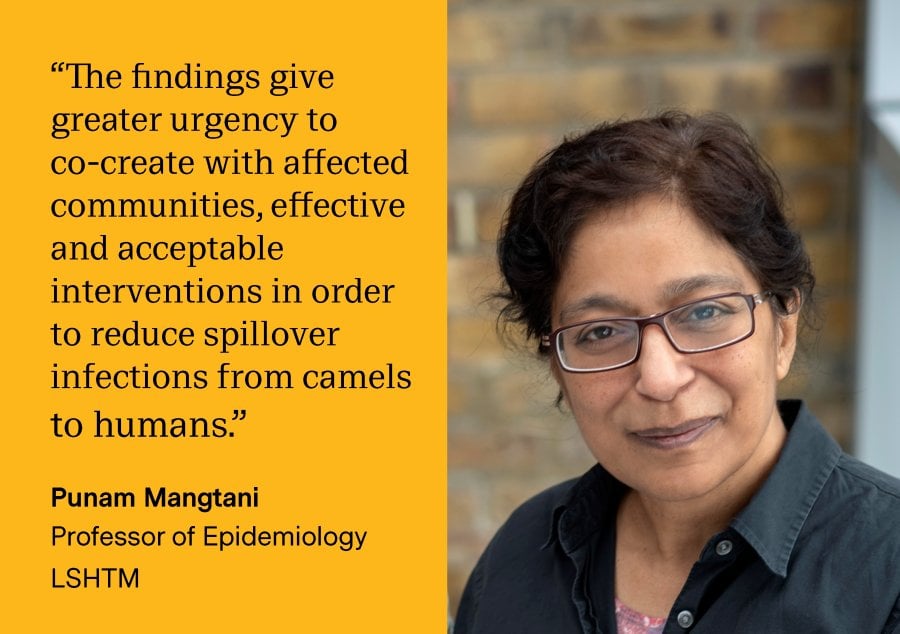
What is Middle East Respiratory Syndrome-related corona virus (MERSCoV) and where is it found?
Middle East Respiratory Syndrome-related corona virus (MERSCoV) is a respiratory virus, which causes minor cold-like symptoms in camels but can be fatal for humans. The Arabian Peninsula is the main region where MERSCoV causes severe respiratory disease and related deaths occur. MERSCoV is less transmissible than for example COVID-19 and is mostly spread via droplets and by touching objects likely to carry the infection, not via aerosols.
Camels are the animal reservoir for this corona virus. Close contact with these animals appears to be the main risk factor for infection in humans with the greatest disease severity seen in older people with underlying health conditions. Most of the world’s camels can be found in West, East and North Africa and central Asia but there are few severe cases of MERSCoV in Africa. This is most likely due to the clade B variant seen in the Arabian Peninsula appearing to replicate better in human lung tissue than clade C found in Africa, although poor surveillance systems could also reduce the detection of cases.
How worried should we be about MERSCoV and the potential for a larger outbreak?
Although most cases are found in the Middle East, our hyperconnected world could allow the virus to travel very quickly. Unfortunately, there hasn’t been a huge amount of research done into MERSCoV but scientists know that it can be easily transmitted in hospital settings. For instance, we saw in South Korea in 2015, how one infection led to a large hospital outbreak of over 100 cases. There is, however, no evidence that suggests the virus is spreading between people in the community- beyond what we found in this study. Namely, the sporadic spillovers from camels to humans who are in regular contact with the animals and the very occasional transmission among household members.
It is however important public health authorities keep a watchful eye on MERSCoV infections. In the early 2000s, a genetic change of SARS-CoV, a virus closely related to MERSCoV, enabled the virus to spillover to humans which then led to human-to-human transmission. This, coupled with MERsCoV’s high potential case-fatality rate of over 30 per cent means identified cases need to be prevented from turning into larger outbreaks.
Can you explain the importance of this study and what role hugging and kissing camels plays in transmission of MERSCoV?
The study has helped fill some gaps in our understanding of how infections can occur in the community where there is not direct camel to human contact. We knew that close contact with camels is a risk factor for transmission. However, it wasn’t clear what specific animal husbandry factors were important to spreading MERSCoV. Our study shows that common practices in camel-owning communities, including kissing and hugging the highly revered animals, can be riskier.
Our study has moreover found supporting evidence for person-to-person transmission which could mean vulnerable household members are at risk. We saw this by the household clustering of MERSCoV antibodies indicating past infection in household members who had no contact with camels themselves but were living with others who were in contact with camels or had antibody evidence of past infection.
The antibodies, as markers of past infection, were also used to assess what specific factors increased the risk of direct transmission to humans from camels. Antibodies were higher in humans with at least weekly close contact with young camels particularly when feeding and watering the animals, giving medicines or petting and kissing them.
How can we stop the spread of MERSCoV? Is a vaccine available?
We need a holistic public health approach, like OneHealth, which, looks at the environmental, animal and human factors affecting the wellbeing of all three. For this work, our research is aimed at preventing spillover infections from animals to humans. We know most emerging infections come from animals. We need to interrupt MERSCoV transmission by behaviour change as well as by developing effective and safe vaccines for humans and camels. There are several vaccine candidates currently in production. For example, there is a recombinant vaccine based on modified vaccinia virus Ankara (MVA), however there is to my knowledge not one ready for preventing MERSCoV transmission from camels. A large third phase 1 trial in adults 50-70 years is underway. This vaccine is of a similar basis to the Oxford/AstraZeneca COVID-19 vaccines.
In terms of animal vaccines, camels are sometimes given vaccines, including against camelpox so we have opportunities to vaccinate. As mentioned earlier, MERSCoV causes mild illness in camels so we need further research to understand whether such a vaccine would be effective and acceptable to camel owners. They need to be aware of the benefits of vaccination against any potential drawbacks such as side-effects in their animals.
Our research group is now working on a feasibility trial examining the acceptability and uptake of animal husbandry changes.
Note: The research was funded by UK Research and Innovation (UKRI). conducted by researchers from LSHTM, the Royal Veterinary College, Rocky Mountain Laboratories (NIH), Jordan University of Science and Technology (JUST), Yarmouk University and the Jordanian government. The research was a cross-sectional study between September 2017 and October 2018 and encompassed 879 people comprising 204 livestock-owning households in southern Jordan.
LSHTM's short courses provide opportunities to study specialised topics across a broad range of public and global health fields. From AMR to vaccines, travel medicine to clinical trials, and modelling to malaria, refresh your skills and join one of our short courses today.
